新目标九年级英语Unit12测试题及答案
- 格式:doc
- 大小:54.00 KB
- 文档页数:8
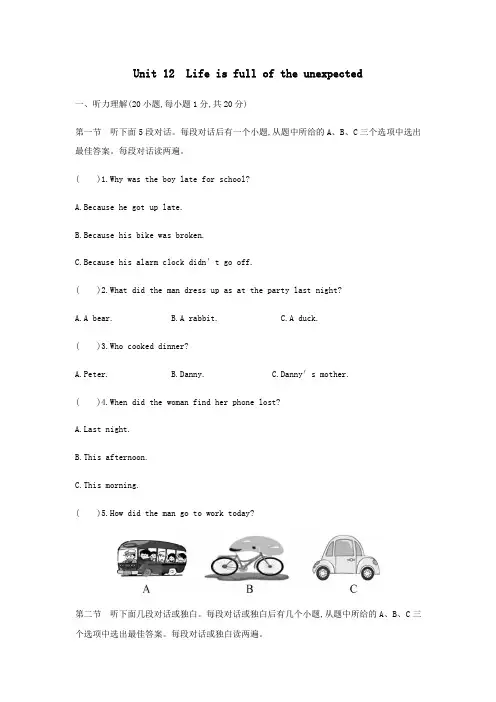
Unit 12 Life is full of the unexpected一、听力理解(20小题,每小题1分,共20分)第一节听下面5段对话。
每段对话后有一个小题,从题中所给的A、B、C三个选项中选出最佳答案。
每段对话读两遍。
( )1.Why was the boy late for school?A.Because he got up late.B.Because his bike was broken.C.Because his alarm clock didn′t go off.( )2.What did the man dress up as at the party last night?A.A bear.B.A rabbit.C.A duck.( )3.Who cooked dinner?A.Peter.B.Danny.C.Danny′s mother.( )4.When did the woman find her phone lost?st night.B.This afternoon.C.This morning.( )5.How did the man go to work today?第二节听下面几段对话或独白。
每段对话或独白后有几个小题,从题中所给的A、B、C三个选项中选出最佳答案。
每段对话或独白读两遍。
听下面一段对话,回答第6至第7两个小题。
( )6.What′s wrong with Eric?A.He fell down in the race.B.He was ill.C.Somebody hit him.( )7.How long does Eric have to stay in bed?A.For seven days.B.For less than one month.C.For more than two and a half months.听下面一段对话,回答第8至第9两个小题。
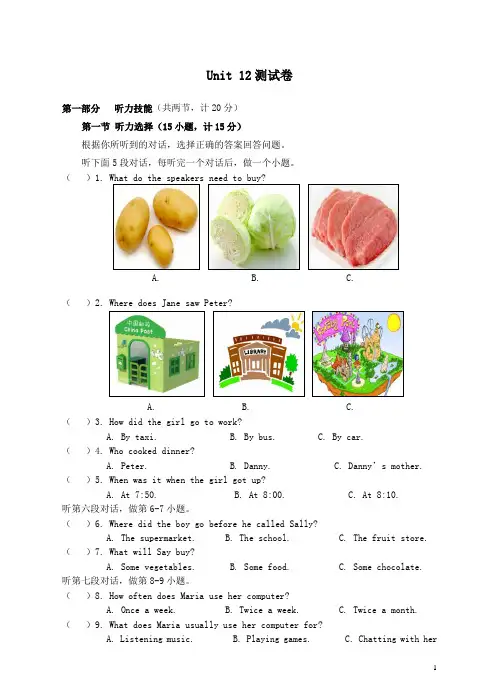
Unit 12测试卷第一部分听力技能(共两节,计20分)第一节听力选择(15小题,计15分)根据你所听到的对话,选择正确的答案回答问题。
听下面5段对话,每听完一个对话后,做一个小题。
()1. What do the speakers need to buy?A. B. C.()2. Where does Jane saw Peter?A. B. C.()3. How did the girl go to work?A. By taxi.B. By bus.C. By car.()4. Who cooked dinner?A. Peter.B. Danny.C. Danny’s mother. ()5. When was it when the girl got up?A. At 7:50.B. At 8:00.C. At 8:10.听第六段对话,做第6-7小题。
()6. Where did the boy go before he called Sally?A. The supermarket.B. The school.C. The fruit store. ()7. What will Say buy?A. Some vegetables.B. Some food.C. Some chocolate.听第七段对话,做第8-9小题。
()8. How often does Maria use her computer?A. Once a week.B. Twice a week.C. Twice a month. ()9. What does Maria usually use her computer for?A. Listening music.B. Playing games.C. Chatting with herfriends.听第八段对话,做第10-12小题。
()10. What’s wrong with Bob?A. He had a toothacheB. He stayed up last night.C. He wa s ill. ()11. What’s the date today?A. March 30th.B. April 1st.C. April 2nd()12. How is Bob feeling now?A. He wants to sleep.B. He is angry.C. He feels worse.听第九段对话,做第13-15小题。
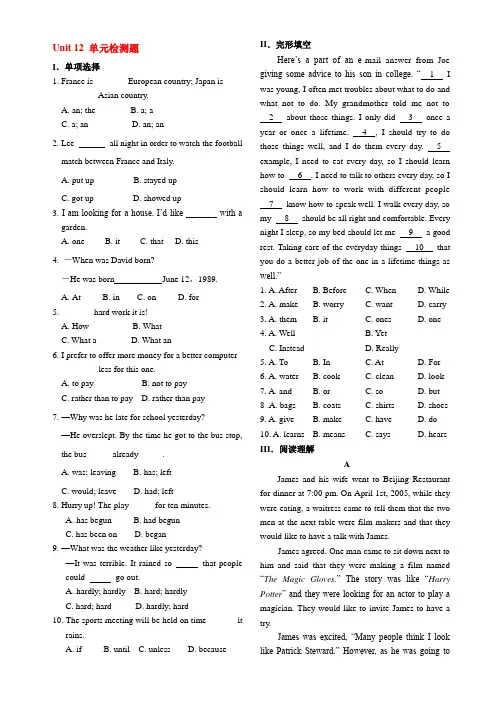
Unit 12 单元检测题I.单项选择1. France is _______ European country; Japan is_______ Asian country.A. an; theB. a; aC. a; anD. an; an2. Lee all night in order to watch the football match between France and Italy.A. put upB. stayed upC. got upD. showed up3. I am looking for a house. I’d like _______ with a garden.A. oneB. itC. thatD. this4. -When was David born?-He was born June 12,1989.A. AtB. inC. onD. for5. _______ hard work it is!A. HowB. WhatC. What aD. What an6. I prefer to offer more money for a better computer_______ less for this one.A. to payB. not to payC. rather than to payD. rather than pay7. —Why was he late for school yesterday?—He overslept. By the time he got to the bus stop, the bus _____ already _____.A. was; leavingB. has; leftC. would; leaveD. had; left8. Hurry up! The play _____ for ten minutes.A. has begunB. had begunC. has been onD. began9. —What was the weather like yesterday?—It was terrible. It rained so that people could go out.A. hardly; hardlyB. hard; hardlyC. hard; hardD. hardly; hard10. The sports meeting will be held on time ______ itrains.A. ifB. untilC. unlessD. because II.完形填空Here’s a part of an e-mail answer from Joe giving some advice to his son in college. “ 1 I was young, I often met troubles about what to do and what not to do. My grandmother told me not to 2 about those things. I only did 3 once a year or once a lifetime. 4 , I should try to do those things well, and I do them every day. 5__ example, I need to eat every day, so I should learn how to 6 . I need to talk to others every day, so I should learn how to work with different people 7 know how to speak well. I walk every day, so my 8 should be all right and comfortable. Every night I sleep, so my bed should let me 9 a good rest. Taking care of the everyday things 10 that you do a better job of the one-in-a-lifetime things as well.”1. A. After B. Before C. When D. While2. A. make B. worry C. want D. carry3. A. them B. it C. ones D. one4. A. Well B. YetC. InsteadD. Really5. A. To B. In C. At D. For6. A. water B. cook C. clean D. look7. A. and B. or C. so D. but8 .A. bags B. coats C. shirts D. shoes9. A. give B. make C. have D. do10. A. learns B. means C. says D. hears III.阅读理解AJames and his wife went to Beijing Restaurant for dinner at 7:00 pm. On April 1st, 2005, while they were eating, a waitress came to tell them that the two men at the next table were film-makers and that they would like to have a talk with James.James agreed. One man came to sit down next to him and said that they were making a film named “The Magic Gloves.” The story was like “Harry Potter” and they were looking for an actor to play a magician. They would like to invite James to have a try.James was excited, “Many people think I look like Patrick Steward.” However, as he was going toleave China in 3 days, he wanted to try out after dinner. The man agreed.At 9:00 pm, when James asked for the bill so that he could go with the film-makers, the manager of Beijing Restaurant said sorry to him with a smile, “I t’s April Fool’s Day joke! Your meal is free. Thank you.”James completely forgot about it but when he found that he was fooled, he didn’t leave at once. The waitress asked him if he needed some help. James said, “I was fooled once. I’m afraid the meal is not free. I am waiting for the bill to see if it is another joke.”1. James came to the restaurant _________.A. to have dinnerB. to meet the film-makersC. to celebrate April Fool’s DayD. to play a magician2. James agreed to act out because .A. he was fullB. he thought he looked like Patrick StewardC. he wanted to make some moneyD. he liked Harry Potter3. The p hrase “was fooled” in the last paragraphprobably means .A. was attackedB. was laughed atC. was disturbedD. was played a joke on4. Which of the following is true?A. James stayed at the restaurant for less than twohours.B. The two men sitting next to him were reallyfilm-makers.C. James didn’t know it was April Fool’s Day untilhe was told so.D. James left the restaurant right after dinner.5. When the manager came to tell him the truth,James .A. was angry that he had been fooledB. was pleased that he had been given a free mealC. was still not sure if they were playing anotherjoke on himD. decided to wait for another free mealBA great man married the woman and they had a little lovely girl.When the little girl was growing up, the man usually hugged her and said, “I love you, little girl.” The little girl would say, “I am not a little girl any more.” Then the man would laugh, “But to me, you’ll always be my little girl.”The little girl later left her home and went into the world. No matter where she was, the man would call her and say, “I love you, little girl.”One day the little girl received an unexpected phone call. The great man had a stroke. He couldn’t talk, smile, walk, hug or dance.She went to the side of the great man soon. He looked at her and tried to speak, but he could not. She sat next to the great man, and drew her arms around his useless shoulders. Her head on his chest, she thought of many good memories. She felt sad for she couldn’t hear the words of love that had comforted her.And then she heard from within the man, the beat of heart. The magic happened. She heard what she wanted to hear. His heart beat out the words that his mouth could no lon ger say... I love you, little girl (I)love you, little girl.1. The great man ______ when the little girl said, “I’m not a little girl any more.”A. felt sadB. was happyC. was angryD. couldn’t stand2. What did the man do after the little girl left herhome?A. He left her wife.B. He learned to sing and dance.C. He left his home and went into the world.D. He would call her and expressed his love to her.3. The little girl went to her father because_______.A. he had a stroke.B. she missed her parentsC. she made a lot of money outsideD. she didn’t get his father’s calls4. What can we learn from what the girl had done after seeing his father?A. She knew his father would die soon.B. She had regretted for leaving his father.C. She loved her father deeply too.D. She was sure his father would recover soon.IV . 选择恰当的单词填空,将答案填写在文章下面的横线上,每词限用一次。
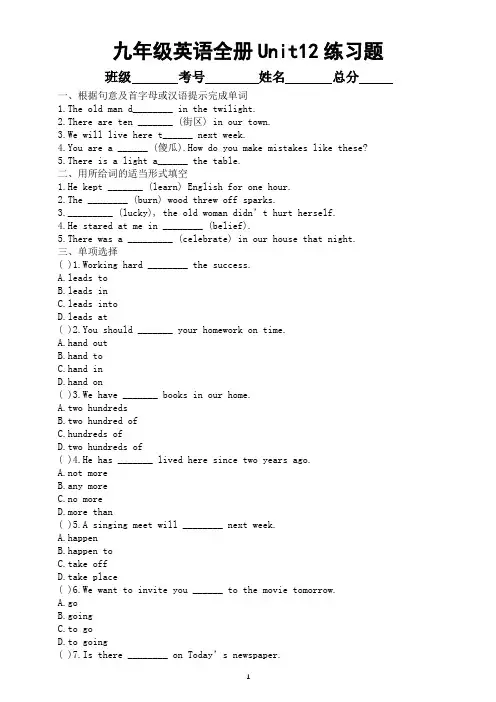
九年级英语全册Unit12练习题班级考号姓名总分一、根据句意及首字母或汉语提示完成单词1.The old man d________ in the twilight.2.There are ten _______ (街区) in our town.3.We will live here t______ next week.4.You are a ______ (傻瓜).How do you make mistakes like these?5.There is a light a______ the table.二、用所给词的适当形式填空1.He kept _______ (learn) English for one hour.2.The ________ (burn) wood threw off sparks.3._________ (lucky), the old woman didn’t hurt herself.4.He stared at me in ________ (belief).5.There was a _________ (celebrate) in our house that night.三、单项选择( )1.Working hard ________ the success.A.leads toB.leads inC.leads intoD.leads at( )2.You should _______ your homework on time.A.hand outB.hand toC.hand inD.hand on( )3.We have _______ books in our home.A.two hundredsB.two hundred ofC.hundreds ofD.two hundreds of( )4.He has _______ lived here since two years ago.A.not moreB.any moreC.no moreD.more than( )5.A singing meet will ________ next week.A.happenB.happen toC.take offD.take place( )6.We want to invite you ______ to the movie tomorrow.A.goB.goingC.to goD.to going( )7.Is there ________ on Today’s newspaper.A.something elseB.anything elseC.else somethingD.else something( )8.Tony realized he _____ his homework at home.A.had leftB.has leftC.leftD.leaves( )9.He is ________ out for a walk with his dog.A.about to goB.about goingC.about to goingD.about go( )10.The alarm clock didn’t _______.A.wake up meB.wake me upC.wake me toD.wake to me四、翻译句子1.他的书包里装满了书。
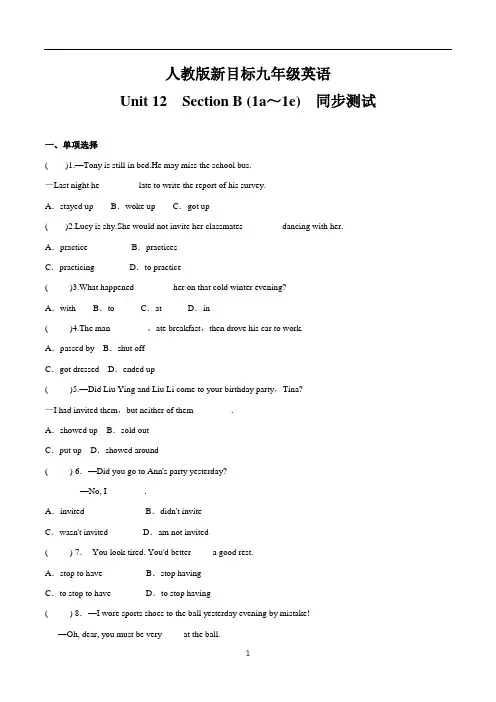
人教版新目标九年级英语Unit 12Section B (1a~1e) 同步测试一、单项选择( )1.—Tony is still in bed.He may miss the school bus.—Last night he ________ late to write the report of his survey.A.stayed up B.woke up C.got up( )2.Lucy is shy.She would not invite her classmates ________ dancing with her. A.practice B.practicesC.practicing D.to practice( )3.What happened ________ her on that cold winter evening?A.with B.to C.at D.in( )4.The man ________,ate breakfast,then drove his car to work.A.passed by B.shut offC.got dressed D.ended up( )5.—Did Liu Ying and Liu Li come to your birthday party,Tina?—I had invited them,but neither of them ________.A.showed up B.sold outC.put up D.showed around( ) 6.—Did you go to Ann's party yesterday?—No, I _______ .A.invited B.didn't inviteC.wasn't invited D.am not invited( ) 7.You look tired. You'd better ____ a good rest.A.stop to have B.stop havingC.to stop to have D.to stop having( ) 8.—I wore sports shoes to the ball yesterday evening by mistake!—Oh, dear, you must be very ____ at the ball.A.embarrassed B.satisfiedC.tired D.surprised( ) 9.—Oh, the classroom is _____!Where are the students?—They're all on the playground.A.full B.bigC.empty D.bright( ) 10.The man ______,ate breakfast, then drove his car to work.A.passed by B.sold outC.show off D.got dressed( )11.I have refused such a good job.I'm really a(n).A. artistB. farmerC. foolD. actor( )12.Molly didn't wake up even though her alarm clock______.A. ran offB. went offC. took offD. turned off( )13.—It's said that Jay Chou sang his latest song in the concert.—That's impossible.In fact,he had never ______ by the time the concert ended.A. put upB. set upC. shown upD. fixed up ( )14.It was such an ______joke that everyone felt really______.A. embarrassing,embarrassedB. embarrassed,embarrassingC. embarrassed,embarrassedD. embarrassing,embarrassing( )15.—Did you see Tom at the airport?—No. His plane ______by the time I ______there.A. has taken off,gotB. took off,had got,C. took off,gotD. had taken off,got二、完形填空When I 16up this morning,it was already ten o'clock. I got 17as soon as possible and 18to school by bike with my backpack on my back. I didn't 19that it was 20until I got to school and sawthe school was empty. We don't go to school on Sunday. Then I went to my grandparents' house. I hadn't 21 them for a long time. They were 22to see me and 23 a big meal for me. After we had lunch together,we went to the park. I 24photos of them. We walked around the lake. I had a good time., At night I watched TV,but I didn't 25late. Before I went to bed,I put my alarm beside me. It would go off and wake me up on Monday.()16.A.wake B. woke C. got D. get()17.A.dressed B. dressing C. dresses D. dress()18.A.ran B. rushed C. hurry D. go()19.A.knew B. realize C. realized D. remember()20.A.Sunday B. Monday C. Tuesday D. Wednesday()21.A.meet B. with C. seen D. looked()22.A.please B. happy C. sad D. angry()23.A.do B. gave C. make D. prepared()24.A.take B. took C. made D. make()25.A.stay up B. take out C. put up D.s how up三、词汇运用A)根据句意及汉语提示填写单词。
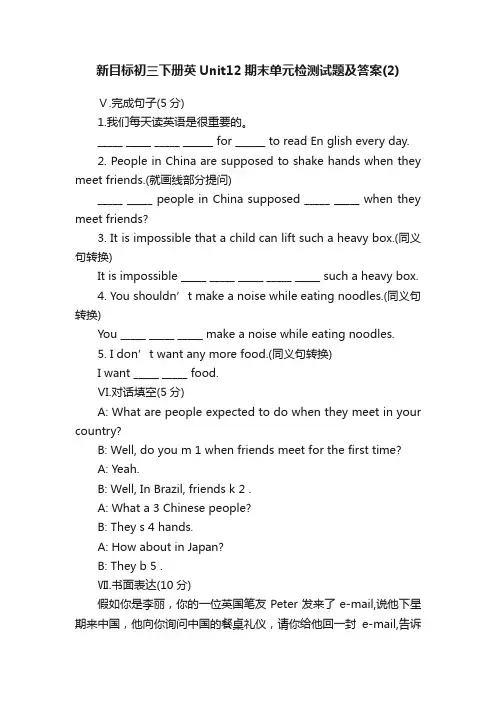
新目标初三下册英Unit12期末单元检测试题及答案(2)Ⅴ.完成句子(5分)1.我们每天读英语是很重要的。
_____ _____ _____ ______ for ______ to read En glish every day.2. People in China are supposed to shake hands when they meet friends.(就画线部分提问)_____ _____ people in China supposed _____ _____ when they meet friends?3. It is impossible that a child can lift such a heavy box.(同义句转换)It is impossible _____ _____ _____ _____ _____ such a heavy box.4. You shouldn’t make a noise whi le eating noodles.(同义句转换)You _____ _____ _____ make a noise while eating noodles.5. I don’t want any more food.(同义句转换)I want _____ _____ food.Ⅵ.对话填空(5分)A: What are people expected to do when they meet in your country?B: Well, do you m 1 when friends meet for the first time?A: Yeah.B: Well, In Brazil, friends k 2 .A: What a 3 Chinese people?B: They s 4 hands.A: How about in Japan?B: They b 5 .Ⅶ.书面表达(10分)假如你是李丽,你的一位英国笔友Peter发来了e-mail,说他下星期来中国,他向你询问中国的餐桌礼仪,请你给他回一封e-mail,告诉他相关事宜。
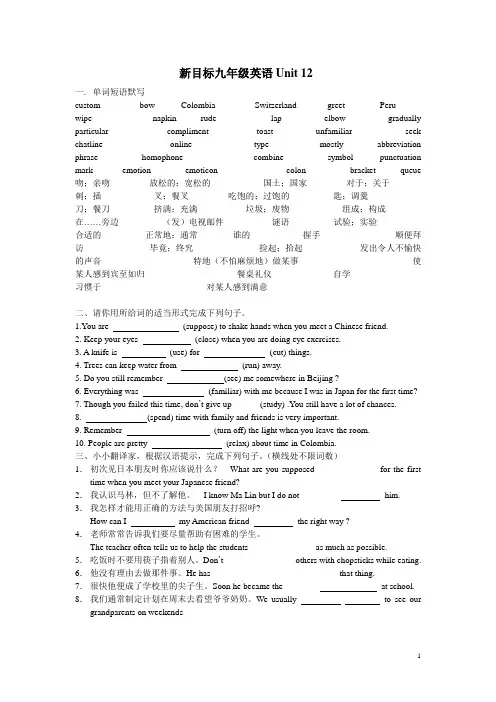
新目标九年级英语Unit 12一. 单词短语默写custom bow Colombia Switzerland greet Peruwipe napkin rude lap elbow gradually particular compliment toast unfamiliar seek chatline online type mostly abbreviation phrase homophone combine symbol punctuation mark emotion emoticon colon bracket queue 吻;亲吻放松的;宽松的国土;国家对于;关于刺;插叉;餐叉吃饱的;过饱的匙;调羹刀;餐刀挤满;充满垃圾;废物组成;构成在……旁边(发)电视邮件谜语试验;实验合适的正常地;通常谁的握手顺便拜访毕竟;终究捡起;拾起发出令人不愉快的声音特地(不怕麻烦地)做某事使某人感到宾至如归餐桌礼仪自学习惯于对某人感到满意二、请你用所给词的适当形式完成下列句子。
1.Y ou are (suppose) to shake hands when you meet a Chinese friend.2. Keep your eyes (close) when you are doing eye exercises.3. A knife is (use) for (cut) things.4. Trees can keep water from (run) away.5. Do you still remember (see) me somewhere in Beijing ?6. Everything was (familiar) with me because I was in Japan for the first time?7. Though you failed this time, don’t give up______ (study) .Y ou still have a lot of chances.8. (spend) time with family and friends is very important.9. Remember (turn off) the light when you leave the room.10. People are pretty (relax) about time in Colombia.三、小小翻译家,根据汉语提示,完成下列句子。
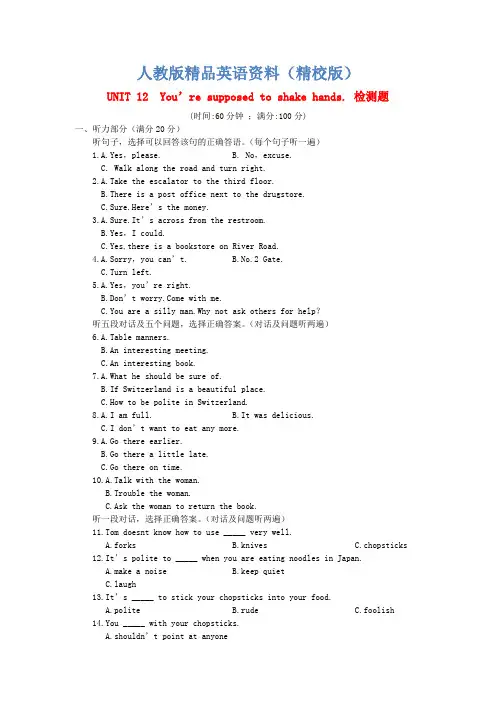
人教版精品英语资料(精校版)UNIT 12 You’re supposed to shake hands. 检测题(时间:60分钟;满分:100分)一、听力部分(满分20分)听句子,选择可以回答该句的正确答语。
(每个句子听一遍)1.A.Yes,please. B. No,excuse.C. Walk along the road and turn right.2.A.Take the escalator to the third floor.B.There is a post office next to the drugstore.C.Sure.Here’s the money.3.A.Sure.It’s across from the restroom.B.Yes,I could.C.Yes,there is a bookstore on River Road.4.A.Sorry,you can’t. B.No.2 Gate.C.Turn left.5.A.Yes,you’re right.B.Don’t e with me.C.You are a silly man.Why not ask others for help?听五段对话及五个问题,选择正确答案。
(对话及问题听两遍)6.A.Table manners.B.An interesting meeting.C.An interesting book.7.A.What he should be sure of.B.If Switzerland is a beautiful place.C.How to be polite in Switzerland.8.A.I am full. B.It was delicious.C.I don’t want to eat any more.9.A.Go there earlier.B.Go there a little late.C.Go there on time.10.A.Talk with the woman.B.Trouble the woman.C.Ask the woman to return the book.听一段对话,选择正确答案。
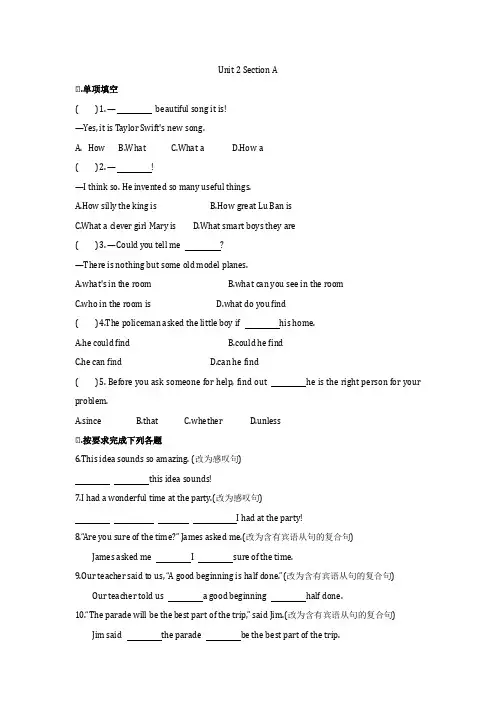
Unit 2 Section AⅠ.单项填空()1. —beautiful song it is!—Yes, it is Taylor Swift's new song.A.HowB.WhatC.What aD.How a()2. —!—I think so. He invented so many useful things.A.How silly the king isB.How great Lu Ban isC.What a clever girl Mary isD.What smart boys they are()3. —Could you tell me ?—There is nothing but some old model planes.A.what's in the roomB.what can you see in the roomC.who in the room isD.what do you find()4.The policeman asked the little boy if his home.A.he could findB.could he findC.he can findD.can he find()5. Before you ask someone for help, find out he is the right person for your problem.A.sinceB.thatC.whetherD.unlessⅠ.按要求完成下列各题6.This idea sounds so amazing. (改为感叹句)this idea sounds!7.I had a wonderful time at the party.(改为感叹句)I had at the party!8.“Are you sure of the time?” James asked me.(改为含有宾语从句的复合句)James asked me I sure of the time.9.Our teacher said to us, “A good beginning is half done.”(改为含有宾语从句的复合句)Our teacher told us a good beginning half done.10.“The parade will be the best part of the trip,” said Jim.(改为含有宾语从句的复合句)Jim said the parade be the best part of the trip.Ⅰ.用所给单词的适当形式填空11.Look! The boy is (tie) a tie in front of the mirror.12.Yesterday was my birthday, so my mother (take) me out for dinner.13.Foreigners are very open and (show) their love for their families clearly.14.Studying hard is a good way (go) to college.Ⅰ.阅读理解Weeks before Tomb-Sweeping Day on April 4 this year, hundreds of qingtuan were sold each day. The snack was still a must-have for many people.In the southern part of China, eating qingtuan at the beginning of spring is a kind of tradition. Chinese people started to eat it more than 2,000 years ago. It is made of sticky rice(糯米) and red bean paste(红豆沙) and is famous for its softness, freshness and sweetness. The secret behind its mouth-watering taste is one of its materials—mugwort leaves(艾蒿叶). The plant is mainly found in the Yangtze River Delta(长江三角洲) where it has perfect conditions to grow.People in this area usually put qingtuan on the tombs(墓) of their dead family members to cherish the past memory. Making qingtuan is also a chance for family members to get together at home. It really takes time and effort to make the snack.Now, qingtuan has already spread its special taste to the northern part of China. Li Yuan, a 30-year-old engineer who grew up in Zhejiang Province, brought qingtuan back to Beijing where he works. “It tastes different in and out of my hometown,” he said. “There's no place like home.”Qingtuan has many different tastes inside it, such as apples and bean milk, to meet customers' tastes. The difference of the taste shows that it's getting more and more popular across the whole country.Even though there is warm weather and green leaves in spring, the season wouldn't be complete without a taste of qingtuan.()15.Your mouth waters when seeing qingtuan because of the .A.sticky riceB.green colorC.red bean pasteD.mugwort leaves()16.The underlined word “cherish” in the third paragraph probably means“”.A.遗忘B.怀念C.祈求D.清除()17.We can know from the passage that Li Yuan .A.loves no placeB.sells qingtuanC.works in BeijingD.works as a cook()18.Which is the best title for this passage?A.Growing Up in BeijingB.Planting Rice in ZhejiangC.Meeting Customers' TastesD.Marking the Start of Spring答案Ⅰ.1.C 2.B3.A4.A5.CⅠ.6.How amazing7.What a wonderful time 8.if/whether; was9.that; is10.that; wouldⅠ.11.tying12.took13.show 14.to goⅠ DBCDUnit 12 Section BⅠ.根据句意及汉语提示完成句子1.Yesterday evening a TV show reported the (发现) of special water.2. (女士) and gentlemen, let me introduce myself to you first.3.The old man asked those (军官) how to get to the supermarket.4.The sports meeting was (取消) because of the terrible weather.5.The matter is very strange.Do you think it is (可相信的)?Ⅰ.用所给单词的适当形式填空6.Teachers' Day is coming. We're going to hold a (celebrate) for our teachers.7.We need to make more young people learn Shadow Play so that it won't (appear) in China.8.Huawei is one of the (big) smartphone makers in the world.9.By the time I got to the train station, the train (leave).10.I think you should take more exercise if you want to lose (weigh).Ⅰ.根据汉语意思完成句子11.他的书如此受欢迎,以至于在一个月内都卖光了。
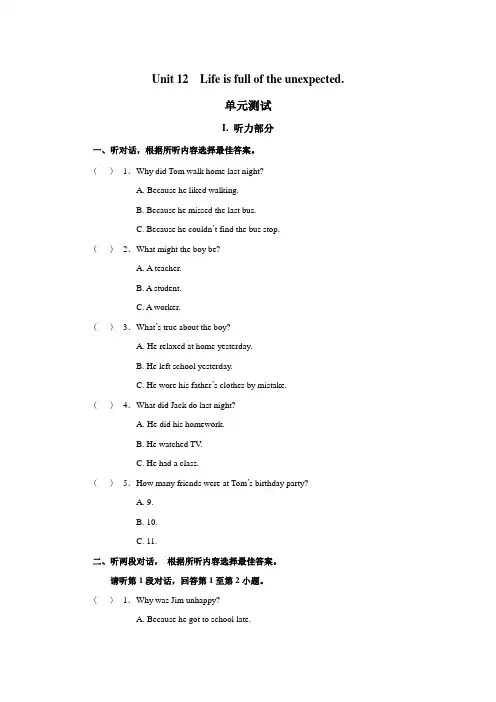
Unit 12 Life is full of the unexpected.单元测试I. 听力部分一、听对话,根据所听内容选择最佳答案。
( ) 1.Why did Tom walk home last night?A. Because he liked walking.B. Because he missed the last bus.C. Because he couldn’t find the bus stop.( ) 2.What might the boy be?A. A teacher.B. A student.C. A worker.( ) 3.What’s true about the boy?A. He relaxed at home yesterday.B. He left school yesterday.C. He wore his father’s clothes by mistake.( ) 4.What did Jack do last night?A. He did his homework.B. He watched TV.C. He had a class.( ) 5.How many friends were at Tom’s birthday party?A. 9.B. 10.C. 11.二、听两段对话,根据所听内容选择最佳答案。
请听第1段对话,回答第1至第2小题。
( ) 1.Why was Jim unhappy?A. Because he got to school late.B. Because his desk was missing.C. Because Bill laughed at him.( ) 2.What was the date that day?A. April 1.B. May 1.C. June 1.请听第2段对话,回答第3至第5小题。
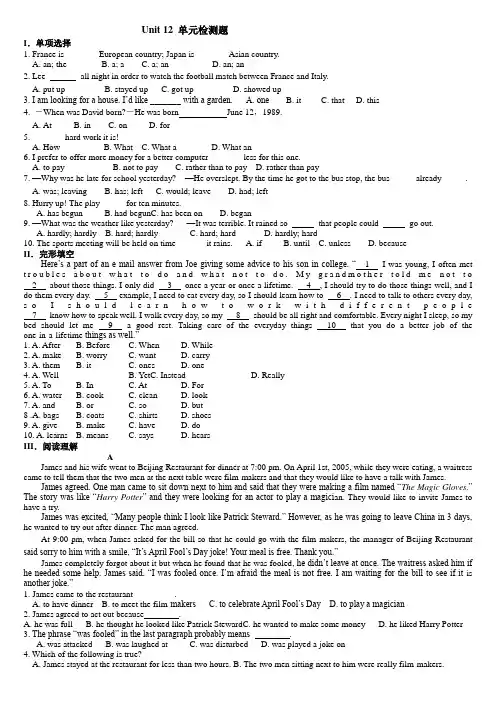
Unit 12 单元检测题I.单项选择1. France is _______ European country; Japan is _______ Asian country.A. an; theB. a; aC. a; anD. an; an2. Lee all night in order to watch the football match between France and Italy.A. put upB. stayed upC. got upD. showed up3. I am looking for a house. I’d like _______ with a garden. A. one B. it C. that D. this4. -When was David born?-He was born June 12,1989.A. AtB. inC. onD. for5. _______ hard work it is!A. HowB. WhatC. What aD. What an6. I prefer to offer more money for a better computer _______ less for this one.A. to payB. not to payC. rather than to payD. rather than pay7. —Why was he late for school yesterday? —He overslept. By the time he got to the bus stop, the bus _____ already _____.A. was; leavingB. has; leftC. would; leaveD. had; left8. Hurry up! The play _____ for ten minutes.A. has begunB. had begunC. has been onD. began9. —What was the weather like yesterday? —It was terrible. It rained so that people could go out.A. hardly; hardlyB. hard; hardlyC. hard; hardD. hardly; hard10. The sports meeting will be held on time ______ it rains. A. if B. until C. unless D. becauseII.完形填空Here’s a part of an e-mail answer from Joe giving some advice to his son in college. “ 1 I was young, I often met t r o u b l e s a b o u t w h a t t o d o a n d w h a t n o t t o d o.M y g r a n d m o t h e r t o l d m e n o t t o 2 about those things. I only did 3 once a year or once a lifetime. 4 , I should try to do those things well, and I do them every day. 5__ example, I need to eat every day, so I should learn how to 6 . I need to talk to others every day, s o I s h o u l d l e a r n h o w t o w o r k w i t h d i f f e r e n t p e o p l e 7 know how to speak well. I walk every day, so my 8 should be all right and comfortable. Every night I sleep, so my bed should let me 9 a good rest. Taking care of the everyday things 10 that you do a better job of the one-in-a-lifetime things as well.”1. A. After B. Before C. When D. While2. A. make B. worry C. want D. carry3. A. them B. it C. ones D. one4. A. Well B. YetC. Instead D. Really5. A. To B. In C. At D. For6. A. water B. cook C. clean D. look7. A. and B. or C. so D. but8 .A. bags B. coats C. shirts D. shoes9. A. give B. make C. have D. do10. A. learns B. means C. says D. hearsIII.阅读理解AJames and his wife went to Beijing Restaurant for dinner at 7:00 pm. On April 1st, 2005, while they were eating, a waitress came to tell them that the two men at the next table were film-makers and that they would like to have a talk with James.James agreed. One man came to sit down next to him and said that they were making a film named “The Magic Gloves.” The story was like “Harry Potter” and they were looking for an actor to play a magici an. They would like to invite James to have a try.James was excited, “Many people think I look like Patrick Steward.” However, as he was going to leave China in 3 days, he wanted to try out after dinner. The man agreed.At 9:00 pm, when James asked for the bill so that he could go with the film-makers, the manager of Beijing Restaurant said sorry to him with a smile, “It’s April Fool’s Day joke! Your meal is free. Thank you.”James completely forgot about it but when he found that he was fooled, he didn’t leave at once. The waitress asked him if he needed some help. James said, “I was fooled once. I’m afraid the meal is not free. I am waiting for the bill to see if it is another joke.”1. James came to the restaurant _________.A. to have dinnerB. to meet the film-makersC. to celebrate April Fool’s DayD. to play a magician2. James agreed to act out because .A. he was fullB. he thought he looked like Patrick StewardC. he wanted to make some moneyD. he liked Harry Potter3. The phrase “was fooled” in the last paragraph probably means .A. was attackedB. was laughed atC. was disturbedD. was played a joke on4. Which of the following is true?A. James stayed at the restaurant for less than two hours.B. The two men sitting next to him were really film-makers.C. James didn’t know it was April Fool’s Day until he was told so.D. James left the restaurant right after dinner.5. When the manager came to tell him the truth, James .A. was angry that he had been fooledB. was pleased that he had been given a free mealC. was still not sure if they were playing another joke on himD. decided to wait for another free mealBA great man married the woman and they had a little lovely girl.When the little girl was growing up, the man usually hugged her and said, “I love you, little girl.” The little girl would sa y, “I am not a little girl any more.” Then the man would laugh, “But to me, you’ll always be my little girl.”The little girl later left her home and went into the world. No matter where she was, the man would call her and say, “I love you, little girl.”One day the little girl received an unexpected phone call. The grea t man had a stroke. He couldn’t talk, smile, walk, hug or dance.She went to the side of the great man soon. He looked at her and tried to speak, but he could not. She sat next to the great man, and drew her arms around his useless shoulders. Her head on his chest, she thought of many good memories. She felt sad for she couldn’t hear the words of love that had comforted her.And then she heard from within the man, the beat of heart. The magic happened. She heard what she wanted to hear. His heart beat out the words that his mouth could no longer say… I love you, little girl… I love you, little girl.1. The great man ______ when the little girl said, “I’m not a little girl any more.”A. felt sadB. was happyC. was angryD. couldn’t stand2. What did the man do after the little girl left her home?A. He left her wife.B. He learned to sing and dance.C. He left his home and went into the world.D. He would call her and expressed his love to her.3. The little girl went to her father because_______.A. he had a stroke.B. she missed her parentsC. she made a lot of money outsideD. she didn’t get his father’s calls4. What can we learn from what the girl had done after seeing his father?A. She knew his father would die soon.B. She had regretted for leaving his father.C. She loved her father deeply too.D. She was sure his father would recover soon.IV.Long long ago, all feelings lived on an island(岛): Happiness, Sadness, Knowledge and all of the others, 1. Love. One day it was said that the island would sink, so all of the feelings were busy making boats and ready to go.The crucial moment came at last! When the island 2. sank, Love gave her boat to poor people who couldn't make a boat. Now it was Love's turn to ask for help.Richness(财富)was passing by Love in a boat. Love said, “Richness, can you take me with you?” Richness 3. , “No, I can't. There is a lot of treasure(金银财宝) in my boat. There is no room here for you.” Just at that time, Sadness was nearer, so Love asked, “Sadness, let me go with you.” “Oh, Love, I am so sad that I need to be alone by 4._______.” Happiness passed by Love, too, but she was too 5. to hear clearly what Love said to her.Suddenly, there was a 6. , “Come on, Love, I will take you.” It was an elder. Love even forgot to ask him where they were going. When they 7. dry land, the elder went away. Love asked Knowledge, another elder, “Who helped me?”“It was Time.” Knowledge answered.“Time?” asked Love. “But why did Time help me?”Knowledge smiled 8. answered, “Because only Time can understand how important Love is.”V.任务型阅读Potatoes are very popular today. But in the past this was not true. Potatoes grew in South America 5,000 years ago. But they only became popular in other places 200 years ago.In the 16th century, the Sp anish took the potato from South America to Europe. But the people didn’t like this strange vegetable. Some people thought that their skins would look like the skin of the plant if they ate the potato. So they only ate the leaves. This made them sick because there is poison (毒药) in the leaves.In the 1800s, people started to eat potatoes. Potatoes became the main food in Ireland. Then something unlucky happened. In 1845, a disease killed all the potatoes in Ireland. Two million people died of hunger.Today each country has its potato dish. Germans eat potato salad, and the USA has the baked potato. Of course, the French invented French fries.Fill in the blanks according to the passage. Only one word for each blank.Potatoes were 1.______ in South America 5,000 years ago. But they weren’t popular in other places 2.______ 200 years ago. In the 16th century, the Spanish took them to Europe. They ate leaves 3.______ of having potatoes. As a result, people were badly ill because of the poison in the leaves. In the 1800s, people started to eat potatoes. 4.______, there was something wrong with the potatoes. Two million people died because of the shortage (缺少) of potatoes in 1845. But now there are many 5.______of potato dishes in the world.参考答案:I. 1—5 CBACB 6—10 DDCBC2. 【解析】B 考查动词短语辨析。
初三英语人教新目标Go For It!九年级全册Unit12同步练Unit12. Life is full of the unexpected一.选择题1.He asked me _____ during the summer holidays.A. where I had beenB. where I had goneC. where had I beenD. where had I gone【答案】A【解析】句意:他问我暑假到哪儿去了。
本题考查宾语从句,宾语从句语序应用陈述句,故排除C、D、 A. where I had been我去了哪里,be是延续性动词,可以和时间段一起使用;B. where I had gone我去了哪里,go 是终止性动词,不能和时间段一起使用;during在…期间,表示一段时间,谓语动词需用延续性动词;根据时间状语during the summer holidays可知用延续性动词,可知选A、2.What ___ Jane ____ by the time he was seven?A. did, doB. has, doneC. did, didD. had, done【答案】D【解析】句意:截止到简七岁时,他做了些什么?by the time +过去时的句子,表示截止到过去的某一时间点,在这之前发生的动作要用过去完成时,故答案为D、3.On hearing the news, her heart was _____ gratitude.A. filled ofB. full withC. filled withD. fill with【答案】C【解析】句意:听到这个消息,她心中充满了感激之情。
考查动词短语。
根据题干On hearing the news, her heart was ____ gratitude.可知句意为“听到这个消息,她心中充满了感激之情。
九年级英语第十二单元期末复习测试题一、单项填空(每小题1分, 共20分)( )1. I think I have _____ my key in the car. A. forget B. left C. forgotten D. leave( )2. By the time he got up, he found his father _____ to work.A. wentB. have goneC. goneD. had gone( )3. What happened _____ Cindy yesterday?—She was hit in a car accident.A. onB. toC. inD. for( )4. When I got to the bus stop, the bus _____ already _____ for 5 minutes.A. has; leftB. had; leftC. has; been awayD. had; been away( )5. _____, he got an "A" in the final exam.A. LuckB. LuckyC. LuckilyD. To lucky( )6. I was nearly late for class yesterday morning, but I only _____ my class.A. madeB. made toC. made it toD. made it( )7. It is _____ good exhibition that I have seen it several times. A. so B. such C. so a D. such a ( )8. My sister _____ a teacher two years ago.A. got married toB. got married ofC. married toD. married with( )9. _____ your sweater. It's cold outside. A. Put on B. Dress C. Wear D. To put on ( )10. Please write down _____ you can in your exercise-books.A. as much as wordsB. as much words asC. as many words asD. as many as words ( )11. When I got to the shop, the fresh vegetables had _____.A. be sold outB. sold outC. been sold outD. sell out( )12. We felt _____ when we heard the _____ news.A. embarrassed; embarrassedB. embarrassing; embarrassedC. embarrassed; embarrassingD. embarrassing; embarrassing( )13. He is a very unfriendly man, so few people _____ at his party last Sunday.A. showed upB. showed offC. showed inD. on show( )14. Tom has lost lots of _____ in the past few months.A. weighB. weighsC. weightD. weighed( )15. My sister _____ the e-mail invitation, but she realized she had forgotten to invite John.A. sent outB. sent upC. sent toD. send out( )16. I like to play jokes _____ my classmates. A. on B. into C. in D. to( )17. _____ he knows it, he'll not let out the secret. A. As if B. Even though C. So that D. What if ( )18. Be sure to keep the classroom _____ after class. A. cleaned B. clean C. to clean D. cleaning ( )19. There is a boy _____ soccer on the street. A. played B. to play C. playing D. play ( )20. The _____ of Columbus was quite an event in the world.A. discoverB. discoveryC. discoveredD. discoveries三、完形填空(每小题1分, 共10分)I think April Fool's Day is a very unusual holiday. On April Fool's Day, you have to watch out for practical 21 . You also cannot trust everything you 22 on April 1st. Even some main newspapers will put fake(假的)articles into their papers to fool people. I heard a story about how 23 April Fool's Day, a London newspaper printed an article about how aliens landed in England. This 24 many people to panic(恐慌)and the local police were not very 25 the newspaper.It can be 26 sometimes to play tricks(开玩笑), but you have to be careful not to go too far. On April Fool's Day, I called my mother from the university I attended. I told her that I was failing all of my classes and because of this, I wasn't able to27 . She was so upset that she started to cry. I felt really bad about making her sad and tried to tell her it was just a joke. 28I told her it was only an April Fool's Day's joke, she got 29 angry with me that she hung up the phone. I had to call her back and apologize before she would talk to me again.April Fool's Day's jokes can be funny but you should be careful not to hurt people's feelings by embarrassing them 30 . Before you act, you should always make sure to put yourself in someone else's shoes and think about how they might feel. ( )21. A. joke B. jokes C. a joke D. to joke( )22. A. hear B. listen C. listen to D. listened( )23. A. on B. in C. for D. of( )24. A. caused B. helped C. asked D. guided( )25. A. interested in B. fond of C. afraid of D. pleased with( )26. A. information B. fun C. healthy D. stupid( )27. A. read B. return C. graduate D. dance( )28. A. After B. Because C. Since D. If( )29. A. so B. such C. such a D. so a( )30. A. too little B. a few C. a little D. too much四、阅读理解(每小题2分, 共30分)A"I just gave birth to 5 babies last weekend. " Isn't that exciting? Oh, you don't believe me? "Okay then, I stole some money from a bank on Saturday night. " Now do you believe me? Actually, I hope you don't. April 1st, or April Fool's Day is the day when we play jokes on people. Do you have it in your country?April Fool's Day started in the sixteenth century in Europe. Before that time, New Year's Day was celebrated on April 1st. If they were teased, they were called fools.Nowadays we play jokes on people on April 1st. For example, someone might put salt in the sugar bottle so another person could put it in his coffee "by accident" . Or someone might change the time on another person's alarm clock so that person would unknowingly wake up earlier or later than planned. Or maybe a person would tell a lie to make someone else shocked.After we play the trick, we say "April Fool" . Then the poor person realized he was fooled. It is generally done in the spirit of fun and doesn't cause any real harm(伤害)to anyone. Do you have any great jokes to play on anyone today? Try it out. Just don't forget to say "April Fool" when the other person begins looking a little confused.( )31. Before the sixteenth century, New Year's Day was _____.A. April 1stB. January 1stC. October 1stD. February 1st( )32. Which of the following situations doesn't make you "April Fool" ?A. Someone might put salt in the sugar bottle, then you could put it in your coffee "by accident" .B. A man might take your bag by mistake, then he could say sorry to you.C. Someone might change the time on your alarm clock, then you would unknowingly wake up earlier or later than planned.D. A person would tell a lie to make someone else shocked.( )33. Sometimes people lie to shock someone on _____.A. New Year's DayB. Christmas DayC. April Fool's DayD. Thanksgiving Day( )34. In the 2nd paragraph, the closest meaning of the underlined word "teased" is _____ in English.A. hitB. criticizedC. laughed atD. shocked( )35. What should be the right attitude(态度)towards "April Fool" ?A. It is generally done in the spirit of fun and doesn't cause any real harm to anyone.B. It is done for the real fools.C. We needn't say "April Fool" when we play jokes on people on April 1st.D. Don't play jokes on people.BValentine's Day is a very old holiday. It goes back to the times of Ancient Rome(古罗马). One of the characters we often see on Valentine's Day is Cupid. He was the son of Venus(维纳斯), the goddess of love. He shoots people with arrows(箭)of love. When a man and a woman are hit by his arrows, they will fall in love.Today people celebrate Valentine's Day on February 14. If a man and a woman are in love, they will give each other gifts. The most popular gifts are flowers(especially roses)and chocolates. Couples may also go to a restaurant for a very nice dinner or plan something else romantic.In the United States, Valentine's Day is not just for lovers. Children make special Valentine's cards for their classmates. Families and friends may give candy or other small gifts to each other. It can be a fun day.( )36. Who is Cupid?A. The arrow of love.B. The goddess of love.C. The son of the goddess of love.D. The first person to celebrate Valentine's Day.( )37. When a man and a woman are hit by Cupid's arrows, they will _____.A. fall in loveB. get gifts from GodC. hate each otherD. fight each other( )38. What are the most popular gifts on Valentine's Day?A. Roses and chocolates.B. Roses and cakes.C. Arrows and cakes.D. Cards and chocolates.( )39. What do school children in the United States do on Valentine's Day?A. They plan something else romantic.B. They make special cards for their classmates.C. They go to a restaurant for a very nice dinner.D. They give candy or other small gifts to each other. ( )40. From the passage, we can NOT get information about _____.A. the date of Valentine's DayB. the most popular giftsC. the story of Valentine's DayD. the feelings of classmates and friendsC五、短文填空(每小题1分, 共10分)Dear Anne,How are you? I had great fun last Wednesday, June 12th, 2013. It was a 46. __________ Chinese festival called the Dragon Boat Festival that day.This festival is in memory of Qu Yuan, one of 47. __________ greatest Chinese poets. He killed himself by jumping into the Miluo River on May 5th of the lunar calendar(阴历), 278 BC. People there rowed the boats to 48. __________ him. But it was too late. They were very sad and then threw rice into the 49. __________ to feed the fishes so that they would stay away from his body.50. __________ then on, every year on this day, people enjoy 51. __________ Zongzi which is made of rice with meat, eggs and so on. In the past we ate it only 52. __________ a year, but now we regarded it as our daily food. We can have it any time we like.Have you ever 53. __________ the dragon boat race on TV? It is another important part of this festival. Several teams row their dragon-shaped boats as 54. __________ as they can. The first team to reach the finish line wins.If you have a plan to visit China next year, would 55. __________ like to spend this festival with us?Best wishes六、用动词的适当形式填空(每题1分,共10分)56. We ________________(paint)the house before we __________(move)in.57. That rich old man __________________(make)a will before he ____________(die).58. They __________________(study)the map of the country before they _________(leave).59. The robbers __________________(run away)before the policemen __________(arrive).60. I ___________________(turn off)all the lights before I ________(go)to bed.61. Paul _________(go)out with Jane after he ______________(make)a phone call.62. Tom _________(say)he _________________(read)the book twice.63. Our plan __________(fail)because we _______________(make)a bad mistake.64. When the chairman ________________(finish)speaking, he _________(leave)the hall.65. The Reads ______________________(have)lunch when I _________(get)to their house.七、完成句子(每题2分,共10分)66. 房间里全是学生。
Unit 11 Sad movies make me cry.单元练习一、单项选择(下列题目的四个选项中只有一个是符合题意的。
)1.Our English teacher is very funny. He often makes us ________ in his classes.A.cry B.to cry C.laugh D.to laugh2.“Take this medicine(服下这些药) and it will make you ________ better soon,” the nurse says to the sick boy.A.feel B.to feel C.feeling D.feels3.Which of the following words is formed like “dishonest”?A.important B.international C.uncomfortable D.interviewer4.Eat more fruits, and they make you ________.A.healthy B.difficult C.interesting D.healthily5.After reading the novel Treasure Island, Jenny has more ________ than before because of the main character, brave Jim. A.victory B.doubt C.luck D.courage6.I have the ________of running before going to work. It has been part of my life.A.spirit B.chance C.courage D.habit7.—I think ________ is very important in life.—I agree. A good friend can help to bring out the best in us.A.beauty B.fame C.wealth D.friendship8.划线字母“o”发音为/əʊ/的单词是________。
新目标英语九年级Unit12单元测试卷注意事项:1.答题前填写好自己的姓名、班级、考号等信息2.请将答案正确填写在答题卡上第I卷(选择题)一、单选题----It is ______ unhealthy habit. You must ask him to change it.A. /, anB. /, aC. the, anD. the, a2.----How was the weather in Jiuzaigou ?----Not so good. I stayed there for several days, but it’s sunny on ______ of the days.A. allB. neitherC. bothD. none3.----We all went to the cinema except you last night. Why didn’t you come ?---- Because I ______ that movie twice.A. have watchedB. had watchedC. was watchingD. would watch4.Oh, it ________so nice. What beautiful music it is !A. smellsB. soundsC. tastesD. looks5.(2013●南京市)---What's wrong with you, Eric? You look tired.---I ________ to prepare for the final exam last night.A. picked upB. woke upC. stayed upD. put up6.----How many English words ______ you ______ by the end of last term ?----Sorry, I don’t know.A. had, learntB. have, learntC. did , learnD. are, learnt7.____ Frank left school at 16, he still become a successful writer.A. Ever sinceB. In factC. After allD. Even though8.----I wore sports shoes to the party yesterday by mistake.----Oh, dear, you must be very ______ at the party.A. embarrassedB. satisfiedC. tiredD. surprised9.After half an hour, other students began to ______ in the schoolyard.A. take offB. show upC. come out ofD. get out of10.Jack passed the exam though he didn’t study hard. When he showed us his report, we all looked at him ______.A. in beliefB. in factC. in disbeliefD. in all11.Please pick me at the ______. My plane will arrive at 12 o’clock.A. hotelB. airportC. museumD. theater12.The Olympic Games of 2016 ______ in Brazil.A. took afterB. took offC. took placeD. took away13.Every student in our class was out except ______, because we had something else to do then.A. Gina and IB. I and GinaC. me and GinaD. Gina and me14.China is larger than ______ country in Europe.A. any otherB. anyC. allD. the other二、阅读理解.Its old meaning is used to express a temperature thatis a little bit cold. As the world has changed, the word has had many different meaning.“Cool”can be used to express feelings of interest in almost anything. When you see a famous car in the street,maybe you will say,“It’s cool.”You ma y think,“He’s so cool,”when you see your favorite footballer.We all maximize(扩大)the meaning of“cool”.You can use it instead of many words such as “new” or “surprising”.Here’s an interesting story we can use to show the way the word is used.A teacher asked her students to write about the waterfall(瀑布)they had visited.On one student’s paper was just the one sentence,“It’s so cool.Maybe he thought it was the best way to show what he saw and felt.But the story also shows a scarcity(缺乏)of words.Without “cool”,some people haveno words to show the same meaning.So it is quite important to keep some credibility(可信性).Can you think of many other words that make your life as colorful as the word “cool”? I can.And I think they are also very cool.15.We know that the word“cool” has had ______.A. only one meaningB. no meaningsC. many different meaningsD. the same meaning16.In the passage,the word“express”means“______”.A. seeB. showC. knowD. feel17.If you are ______ something,you may say,“It’s cool.”A. interested inB. angry withC. afraid ofD. unhappy with18.The writer takes an example to show he is ______ the way the word is used.A. pleased withB. strange toC. worried aboutD. careful with19.In the last paragraph,the writer suggests(暗示)that the word “cool”______.A. can be used instead of many wordsB. usually means something interestingC. can make your life colorfulD. may not(可能不)be as cool as it seemsAmericans are very direct people. When they want something they say “yes” and when they don’t they say “no”. If they want something different from what is given, they ask for it. Here’s an example. I arrive at someone’s house and he gives me wine, I don’t want wine. Maybe I don’t like it or maybe I just don’t want it. I will say “No, thanks.” If everyone around me is drinkingsomething, I would ask for something else, “No, thanks. But I’ll take a bit of tea if you have some.” If I really want wine, I just say, “Yes, thank you.” Unless they happen to know the Chines e customs, westerners will not ask you again and again after you have said you don’t want it.20.If Americans want something, they would say “_______”.A. Yes, thank you.,B. No, thanks.,C. No, I’m sorry.,D. Yes, why not ?21.When Americans do n ot want what is given, they would say “_______”.A. No, I don’t.,B. No, thanks.,C. Yes, thank you.,D. No, I’m sorry.22.In this passage, “westerners” means_______ .A. the people who live in the west of their countryB. the visitors who go to the Western countriesC. the people who live in the Western countriesD. the people who know the customs of the West23.The Chinese people might if you don’t want something given.A. be glad,B. say “thank you”C. get angry,D. ask you again to take it24.From this passage we know that__.A. the Chinese people are direct,B. the Chinese customs are betterC. the westerners are more polite,D. different countries have different customsOnce upon a time, an old woman had two large water pots. Each hung on the end of apole(杆子)which she carried across her neck. One of the pots had a crack in it while the other pot was perfect, From the river to the house, the cracked pot arrived only half full. And the other pot was always full. The perfect pot took pride in its talent. But the poor cracked pot felt sad for its own disadvantages.One day by the river the cracked pot said to the woman, "I feel bad about myself, because the crack in me causes water to come out all the way back to your house.”The old woman smiled and said, "Why are there flowers on your side of the road, but not on the other pot's side ? That's because I have always known about your crack. So I planted flowerson your side of the road, and every day while we walk back, you water them. For two years I have been able to pick these beautiful flowers to decorate my house, There would not be this beauty without you. Each of us has our own cracks. But the cracks make our lives so interesting and beautiful."So, to all the cracked pot friends, have a great day and remember to smell the flowers on your side of the road !25.If each of the two pots could be filled with 20 kilos of water, the woman would probably get______ kilos of water from the river to the house.A. 10B. 20C. 30D. 4026.How did the cracked pot feel about itself at first ?A. ProudB. HappyC. ExcitedD. Ashamed.27.Which of the following is TRUE according to the passage ?A. The woman preferred the perfect pot to the cracked pot.B. The cracked pot felt more talented than the perfect pot.C. There were beautiful flowers on both sides of the road.D. The old woman decorated her house with some flowers.28.The underlined word disadvantages means ______.A. 缺陷B. 过失C. 笨拙D. 才能29.What can we learn from the story ?A. Practice makes perfect.B. Success never comes easilyC. Early bird catches worms firstD. Everyone has a talent.三、完型填空he wanted to _____it. He _____ Tod and put it in a small boat. He rowed the boat tothe _______of a big river. Just as he ______the poor animal into the river, the boat began to go down. ______the man and Tod _______ into the river.Tod was able to swim, _____Sam couldn't. The dog bit the rope (绳子) and broke (破坏) it. It tried its best to swim ______Sam to save him. The man was saved, so he was very thankful to the dog and he didn't want to kill the dog _____. From then on, he gave the dog as_____food as it wanted.30.A. sell B. buy C. beat D. kill31.A. tied B. pulled C. pushed D. closed32.A. front B. foot C. side D. middle33.A. threw B. carried C. sent D. brought34.A. neither B. nor C. each D. both35.A. fell B. swam C. lost D. jumped36.A. because B. though C. but D. when37.A. with B. towards C. over D. into38.A. no more B. any more C. no longer D. not more39.A. little B. few C. many D. much第II卷(非选择题)四、书面表达“How to behave well ?”为主题的英语征文比赛,请你写一篇短文。
新目标九年级英语Unit 12 词汇专练一、根据句意及汉语提示完成句子1.The government told people not to believe the story.It was a _____(骗局).2. _____(女士)and gentlemen,let me introduce myself to you first.3.The old man asked those _____(军官) how to get to the supermarket.4.The sports meeting was _____(取消) because of the terrible weather.5.The matter is very strange.Do you think it is _____(可相信的)?6.Yesterday evening a TV show reported the _____(发现) of special water.7.Don’t _____(愚弄) that boy.Be kind to him,please.8.I was late for the meeting and it made me so _____(尴尬的)at that time.9.I’ll give you a _____(搭便车) to the station.10.I _____(睡过头) and missed the first bus this morning.二、根据句意和首字母提示写出单词。
1.There is a big m_____ near here. You can buy what you want there.2.Don’t be so nervous. Can’t you see she’s making a f_____ of you?3.On w_____ mornings I usually spend an hour driving to work because of the traffic jam.4.It was a c_____ party. All the students dressed up as different cartoon characters.5.I enjoy the delicious coffee and snacks provided, such as apple p_____ and ice-cream.6.“Are you sure you can work out the problem yourself?” Peter asked me in d_____.7.By the time I arrived at the a_____ , the plane had already taken off.8.David lives three b_____ away from here. Let’s visit him now.9.Bad! We’re too late. The subway had l_____.10.Her death was u_____ . All of us thought it was unbelievable.三、根据句意用所给单词的适当形式填空。
人教版精品英语资料(精校版)Unit12 Life is full of the unexpected.单元练习一、单项选择(共15小题;共15分)1. --- Why was he late for school yesterday?--- He overslept. By the time he got to the bus stop, the bus already .A. was; leavingB. has; leftC. would; leaveD. had; left2. The new suspension bridge by the end of last month.A. has been designedB. had been designedC. was designedD. would be designed3. By the end of the last month, I all the CDs Of Just in Bieber.A. collectB. collectedC. have collectedD. had collected4. Tom was about to close the window his attention was caught by a bird.A. whenB. ifC. andD. till5. --- I saw Mr. Smith in the office at ten yesterday morning.--- That's impossible. He an English party with us then.A. hasB. hadC. was havingD. has had6. --- Stop, look at the sign "NO PHOTOS".--- Sorry, I it.A. don't seeB. didn't seeC. haven't seenD. won't see7. We have all the shoes in your size.A. sold offB. sold upC. sold awayD. sold out8. --- How many English words had you learned the end of last term?--- About 2000, but I've forgotten most of them.A. byB. atC. toD. on9. Jim was going to meet me early this morning at the aquarium but he didn't .A. show upB. give upC. stay upD. set up10. --- Is Jim in the office?--- No, he to the dining hall.A. goesB. would goC. has goneD. had gone11. By yesterday, the plane out of view for more than a month.A. isB. has beenC. wasD. had been12. She didn't go to see the film Lost in Thailand (泰囧) with us because she it already.A. seesB. sawC. has seenD. had seen13. By the time of last year, she the piano for five years.A. learntB. has learntC. had learntD. will learn14. I was about to leave there was a knock on the door.A. whileB. whenC. asD. before15. --- Lisa, I called you just now. Where were you?--- Sorry, I a shower.A. takeB. am takingC. was taking二、单词拼写(单句首字母填空)(共10小题;共10分)16. I o this morning, because my alarm clock didn't go off.17. The child b his fingers while playing with a match yesterday.18. He is not dead. He is still a .19. Mr. Wang a that we would have a picnic tomorrow.20. It's reported that lots of people were f by the hoax.21. I didn't take photos of the UFO, because the UFO had d before I took out the camera.22. Her d about the wild animals will change people's traditional idea about their behaviors.23. After the bell r , all the students rushed out of their classrooms.24. His uncle works t 11:00 every evening.25. Perhaps he'll dress himself up as a clown in the c party.三、单词拼写(根据中文提示拼写单词)(共8小题;共8分)26. They had to (取消) the sports meeting because of the heavy rain.27. Let's hope our difficulties will soon (消失).28. He couldn't answer the teacher's question. He felt (尴尬的).29. In the modern world, new scientific (发现) are being made every day.30. We must work hard when we are (活着的).31. Tom missed the early bus because he (睡过头).32. The President wanted to talk to the doctor before (宣布) his plan.33. She is the public information (官员).四、翻译(根据中文提示完成句子)(共5小题;共10分)34. 我醒来时发现睡过头了。
新目标初三英语Unit 12 单元测试题一.根据句意,用括号中所给词的适当形式填空.puters are used by people for ______ problems. (do)2.Spaceship ______people have reached other parts of the universe. (with)3.Britain is only 30 kilometers away from _____ . (French)4.I think English is _____ than maths. (important)5.The Great Wall is over six ______kilometers long. (thousand)6.The hat was ______of silk. (make)7.The moon ______round the earth . (travel)8.Sheep are ______by farmers for producing wool and meet. (keep)二. 单项选择1.Everyone is supposed ________ a seat belt in the car.A. wearingB. to wearC. to be worn2.What do you feel the chickens ________?A. onB. toC. /3.Your mother look a bit disappointed. You ________ have told her the truth.A. shouldB. mustC. can4.I find ________ difficult to remember everything, though I’m still young.A. thatB. thisC. it5.You must ________ your handwriting. I can’t read your homework.A. improveB. raiseC. notice6.The box is ________ heavy ________ I can’t lift it.A. too, toB. so, thatC. very, thatD. too, that7.Jim has made many friends since he________ to China.A. cameB. comesC. has comeD. will come8.________was the party at Jim’s house last night?A. WhatB. WhenC. HowD. Why9.He gave up ______two years ago. That’s to say, he is a non-smoker now.A. smokeB. smokingC. to smokeD. smoked10.She had never been to the great Wall before. Today she saw it ________ the firsttime.A. atB. forC. inD. by11.Paul doesn’t have to be made ________. He always works hard.A. learnB. to learnC. learningD. learned12.Have you seen the film “Titanic”, ________ was world famous?A. itsB. it’sC. whoseD. which13.Do you know the boy ________ his hand towards us?A. wavesB. to waveC. wavingD. wave14.If you go into trouble you can ________ your teacher ________ help.A. turn, toB. ask, forC. help, withD. look, for15.Do you need ________ to read on the train?A. special anythingB. any special thingC. anything speciallyD. anything special三. 完形填空(A)Where I’m from, we’re pretty 1 about time. If you tell a friend you’re going to their house for dinner, it’s okay if you arrive 2 late. 3 time with family and, friends 4 very important to us. We often just drop 5 our friends’ homes. We don’t usually have to 6 plans to meet our friends. Often we just walk around the town center, seeing as 7 of our friends as we can!1. A. relax B. relaxing C. relaxed2. A. a bit B. a little C. a few3. A. Spend B. Spent C. Spending4. A. is B. are C. were5. A. on B. to C. by6. A. make B. do C. did7. A. much B. many C. more(B)Manners(礼貌)are important to happy relations (关系)among people. No one 1 a person with bad manners. A 2 with good manners never laughs at people when they are in trouble. Instead, he 3 to help them. When he asks for something, he says “ 4 . ”And when he receives something, he 5 says “Thank you”. He does not interrupt(打扰) 6 people when they are talking. He does not talk loudly or laugh loudly 7 public. When he sneezes or spits(吐痰), he uses a 8 . If you are late, you 9 make an apology (道歉)to the teacher either at the time 10 after class.1. A. thinks B. likes C. hates D. loves2. A. boy B. man C. person D. give3. A. tries B. wants C. has D. enjoys4. A. Give me B. Please C. Yes D. Hello5. A. never B. sometime C. usually D. still6. A. every B. some C. his D. other7. A. on B. at C. of D. in8. A. book B. cup C. handkerchief D. hand9. A. should B. will C. could D. may10. A. or B. nor C. and D. but四. 阅读理解(A)Do as the Romans DoThe customs in different countries are rather different. If I have dinner with a Chinese host, he always puts more food onto my plates as soon as I have emptied it. That often discomforts me greatly. I have to eat the food even if I don’t want to, because it is considered bad manners in the West to leave one’s food on the plate. I have already noticed that when a Chinese sits at an American’s dinner party, he very often refuses the offer of food or drink though he is in fact still hungry or thirsty. This might be good manners in China, but it is not in the West at all. In the United States, itis impolite to keep asking someone again and again or insist on his accepting something. Americans have a direct way of speaking. If they want something, they will ask for it. If not, they will say, “No, thanks.” When an American is fed with beer by the host, for example, he might say, “No, thanks. I’ll take some diet, Pepsy-Cola (百事可乐)if you have it. ”That is what an American will do. So when you go to the United States, you had better remember the famous saying: When in Rome, do as the Romans do.1. From the passage, we can know that the Chinese are usually ________ to the guests.A. very hotB. rudeC. impoliteD. cold2. When a foreigner has dinner with a Chinese host, he often feels _______.A. pleasantB. uncomfortableC. satisfiedD. happy3. Why does a Chinese often refuse the offer of food or drink at a dinner party?A. He has had enough.B. He is shy.C. He is afraid that others will laugh at him.D. He thinks it’s poli te to do that.4. When an American wants something to eat or drink at a dinner, he will _______.A. ask for it boldlyB. refuse the offerC. ask for it directlyD. express himself indirectly5. “When in Rome, do as the Romans do “means “________”.A. When you got to Rome, you should act as the Romans doB. When you stay in Rome, you should do as the Romans doC. When you are in a new country, you should do as the locals doD. Romans can be an example for you(B)In England, afternoon tea, taken between four and five, is the most informal (非正式)meal of the day. If you are a friend of the family, you may drop in for tea without an invitation or telling that you are coming. Very often it is not served at a table. The members of the family and visitors take tea in the sitting-room. Each person has a cup and saucer(托盘), a spoon(汤匙)and a small plate for bread-and-butter and cake. By the way, do not help yourself to cake first; bread-and-butter first, then cake if there is any. Another piece of advice: Do not put more than one piece of bread or cake on your plate at the same time.Choose the best answer according to the passage:1. Afternoon tea is usually served with ______.A. tea onlyB. tea and some foodC. tea, dessert and meatD. cake and bread2. If you want to have afternoon tea in a friend’s home, _______.A. it is necessary for you to send a messageB. you should wait for his invitationC. it is impolite for you to go there without taking anything with youD. it is unnecessary for you to call him or send a message3. In the passage, “drop in“means “_________”.A. pay an informal visitB. fall downC. drink at a friend’s homeD. break4. It’s impolite for y ou ______.A. help yourself to cake firstB. share a cup with your friendC. put more than one piece of bread or cake on your plate onceD. all of the above5. Which of the following is NOT true?A. Afternoon tea is often taken in the sitting-room.B. The members of the family often share a cup and saucer, a spoon, etc.C. Afternoon tea is usually taken between lunch and supper.D. Help yourself to bread-and-butter before cake if there is any.(C)Some British and American people like to invite friends for a meal at home. You should not be upset(不安的)if your English friends don’t invite you home. It doesn’t mean they don’t like you.Dinner parties usually start between 7 and 8 p.m. and end at about 11. Ask your hosts(主人)what time you should arrive. It’s polite to bring flowers, chocolates or a bottle of wine as a gift.Usually the evening starts with drinks and snacks(小吃). If you want to be extra polite, say how much you like the room, or the pictures on the wall. But remember-it’s not polite to ask how much things cost.In many families, the husband sits at one of the table and the wife sits at the other end. They eat with their guests.You’ll probably start the meal with soup or something small, then you’ll have meat or fish with vegetables, and then dessert(甜点心), followed by coffee. It’s polite to finish everything on your plate and to take more if you want it.Did you enjoy the evening? Call your hosts the next day, or write them a short “thank you”letter. British and American people like to say “thank you, thank, thank you” all the time!1. If your English friend doesn’t invite you to dinner at home, it means he or she ______.A. doesn’t like youB. likes youC. can’t afford to do soD. is too busy2. It’s impolite ______.A. to ask about the price of a certain thingB. to say “thank you” to hostsC. take nothing with you when you are invited to dinnerD. to eat up everything on your plate3. The meal ends with _______ usually.A. soupB. coffeeC. meat or fishD. dessert4. When you are invited to a dinner party, you’d better _______.A. ask what time you should arriveB. take your wife with youC. drink as more as possibleD. eat more snacks as you can5. Which of the following is true?A. The hosts like the people who sit closer to them.B. The hosts like the people who ask them time, price, age, etc.C. The husband and the wife usually sit together.D. You can call your host the next day or write a letter of thanks after that.五. 写作:请你写一篇文章来介绍一下中国一些方面的风俗习惯,可以包括以下这些方面:·Greeting·eating meals with other people·attending a party目标句型:be supposed to do【试题答案】一. 1. doing 2. without 3. France 4. more important5. thousand6. made7. travels8. kept二. 1.B 2.C 3. A 4.C 5. A 6.B 7.A 8.C 9.B 10. B 11. B 12. D 13. C 14. B 15.D三. (A)1. C 2. A 3. C 4. A 5. C 6. A 7. B(B)[析]题1 like作为实意动词是喜欢之意,而love是爱。